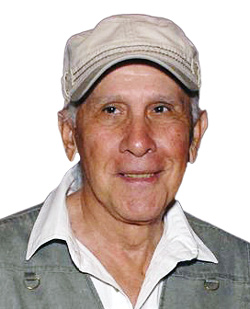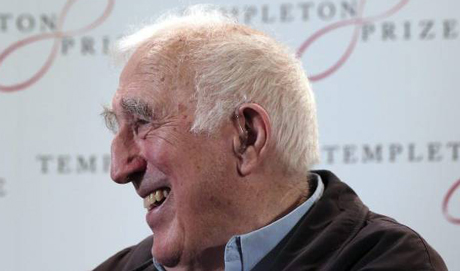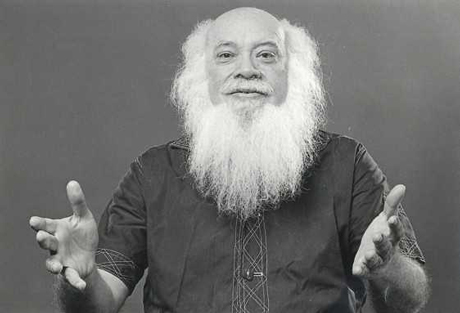June 19, 2019 issue
Authors' & Writers' Corner

Educated in France and England, his family fled Paris just before the Nazi occupation (Wikipedia). At the tender age of 13, he trained for a career as a naval officer at the Dartmouth Naval college. He served in World War Two with the Royal Navy and later with the Royal Canadian Navy.
It is interesting to note that a man of such background gave up a life of privilege to serve institutionalized and developmentally disabled individuals. He founded a home, called L’Arche (The Ark), in August 1964, in France. L’Arche communities have been established in a number of countries around the world since then, including Canada. Vanier lived and worked in these homes which became quite a revelation to him. At first uncomfortable with the handicaps and disabilities of the residents, Vanier’s spirituality grew with the experience.

Over the years, Vanier’s religious retreats, lectures, talks, meetings and books have given him the reputation of being called “a walking saint”. Basically his philosophy is on a belief of an inward movement towards God in each of us and an outward movement toward our fellow human beings – brothers and sisters.
I first became aware of the work of Jean Vanier during my undergraduate studies in psychology at the University of Ottawa (1965–1968). Vanier was giving a series of lectures on love at the medical faculty of that university and I went to listen to him. A quiet, soft spoken, gentle man, his words immediately had an effect on me. I started to take notes, notes that I saved over the years, which now form the basis of this article. It was these same notes that I used to get the attention of my wife, before we were married.
In July 1971, I was working in the Psychological Services of the Ministry of Health in Barbados, when I was asked to deliver a series of talks on sex education to teachers in an in-service program. At the end of the lectures, a small group of teachers including Vivienne (whom I was seeing for the first time), approached me and asked if I would do a lecture on love. I quietly agreed wondering how I would prepare for such a lecture.
I remembered Jean Vanier’s lecture notes and decided to use them. Reading his notes as I write now, Vanier developed the concept of love – psychological, philosophical and religious. He described love as a learned phenomenon, through parental love to altruism. Humans with no experience of love lack a capacity to love.
Along with love comes insecurity and jealousy – the fear of loss of love. The potential of love comes from both internal and external sources. From the religious perspective, our creator is the origin of love. Plato’s philosophy talks about the soul separated from its source, ever wandering, ever restless, never completely satisfied in this life. In essence, the soul is seeking a reunion with God.
Emerson the American poet depicts this yearning as a river seeking its source – the good, the beautiful, the compassionate. Love is assisted by knowledge, true knowledge, not lies and the propaganda that exist today. St. Paul said that if I can move mountains and have no love, I have nothing. Love is long suffering, love is kind, love is not self-serving, love is patient.
Vanier goes on to say that the greatest kind of love is love of man for fellow man, sensitive of the frailty of human nature, cognizant of the weakness and interdependence of human beings, striving for the elevation of the social order and the happiness of all.
Love is supported by the romantic aura which gets people together. Even though the romance may fade, it is replaced by a love which is long lasting and binding. Love is more than sex. There can be no love when another human being is objectified, be it for sex or other gain.
In an impersonal, cold, mechanistic, modern world, there is alienation, suspicion, betrayal, distraction, distrust and estrangement. We become strangers to ourselves and strangers to others. You ask yourself, what have I become? An existentialist dilemma is modern man.
The more complex society becomes, the more grease it needs. Love is that “grease” which helps things to run smoothly. A society that lacks love lacks healing which leads to wars, physical and mental breakdown.
The poet E.E. Cummings writes” slowly, slowly, your slightest smile opens me up”. Walt Whitman the American poet wrote in Song of Myself ‘Whoever you are, wherever you might be, I stop, waiting for you”.
This is the lecture I delivered to Vivienne and some of her colleagues at Presentation College in Barbados on July 31, 1971. In a few short months, Vivienne became my wife!
Jean Vanier wrote a number of famous books including Becoming Human (1998), Made for Happiness (2000) and others. He gave the CBC Massey Lectures Program November, 1998, and has been seen on religious TV programs over the years.
I had the good fortune to meet Jean Vanier during my years at the University of Ottawa at the University Coffee House which was located in the basement of the chaplain’s residence. It was there that I belted out my first poems like "The Last Ride" and "Lovely are the Damned" - included in Song of the West Indies (1986), poems first published in the University of Ottawa student newspaper.
Ironically, I received my first degree B.A. Psychology (cum laude) from the hands of Pauline Vanier, the mother of Jean Vanier, Chancellor of the University of Ottawa, at my graduation in May, 1968. I have been fortunate and blessed to have Jean Vanier’s path cross mine in our lives. He has lived a life of service, fully lived, simple, humble, inspiring and loving. If we could only take a leaf out of his book, we could be much better people. I am sure that God has given him his eternal reward. If the creeks don’t rise and the sun still shines I’ll be talking to you.
Sources: Lectures, notes, books of Jean Vanier. Wikipedia.

By Romeo Kaseram
John Joseph Maria Figueroa was born on August 4, 1920, in Kingston, Jamaica. His son, John Peter, in a celebration of his father’s life published in the Caribbean Quarterly, tells us Figueroa was the first of the ten siblings that survived the 13 children born to father, Rupert Aston Figueroa, and Blanche Maria Palomino. Father was an insurance salesman, while his mother worked at two jobs as a housewife and teacher. Figueroa spent his early life with grandmother, Hilda Palomino; and as his life’s celebration notes, he had a stormy relationship with his father.
Figueroa’s family was devoutly Catholic, and as a result of this faith, attended the Alpha Preparatory School and St George’s College, both run by Jesuits from New England in the US. Following his high school education, Figueroa worked at the Water Commission in Kingston, and then with a scholarship, headed to the Jesuit-run Holy Cross College, Worcester, Massachusetts. Here he studied the classics and liberal arts, graduating in 1942.
According to Figueroa’s son, during the trip to the US his father shared the ship’s cabin with the eminent Jamaican Jesuit priest, the Reverend Gladstone Wilson, and was shocked at the racism that divided both men, and which prevented them from eating at the same dining table while at sea. According to the eulogy, Figueroa protested the discrimination by staying in his cabin.
Figueroa faced many hardships at Holy Cross College during his attendance between 1938-1942. According to the celebration, “… he had little or no money, jobs were hard to find, and the immigration authorities opposed his working”. He managed during those difficult years through the kindness of friends made while at the college, and their families.
Wikipedia tells us Figueroa returned to Jamaica following graduation, where he taught at St George’s College and Wolmer’s School in Jamaica. Then, in 1946, a British Council fellowship took him to London University, where he studied for a teaching diploma and a Masters’ degree in Education. Later, Figueroa taught at schools in London, and then for six years as an English and philosophy lecturer at the Institute of Education.
He was also exploring his creativity during this time, with Pamela Beshoff, writing in the Independent out of London, England, noting Figueroa was one of the “first contributors to that remarkable series which the eminent Henry Swanzy produced for BBC radio, Caribbean Voices”. She tells us Caribbean Voices provided an avenue where “West Indian literary talents first found their voice, in the early 1950s”. Wikipedia notes Figueroa contributed criticism, stories, and poetry.
Beshoff notes Figueroa to be “[large] of life and size as well as vision”, adding he “was eminently suited to filling, in 1957, the chair of Professor of Education at the University College of the West Indies, as it then was, with special relations with London University before attaining full university status in 1962”. He was also the first Caribbean person to hold a chair at UWI. Additionally, he “brought a breath of Caribbean disregard for the pretensions of the English abroad to common rooms in danger of a debilitating stuffiness”.
Wikipedia notes between 1964-1966, he was a visiting professor first at Rhode Island University, and then at Indiana University. Then in the early 1970s, he became Professor of Humanities, leading the Department of Education of the Centro Caribeno de Estudios Postgraduados, Puerto Rico. Beshoff tells us Figueroa was never intimidated by language, and its study was of particular interest. With this as a foundation, Figueroa later “extended his contacts with the non English-speaking Caribbean when he took the post of Professor of English at the University of Puerto Rico”. Afterwards, he joined the staff at the University of Jos in Nigeria in 1975, serving as a Professor of Education until 1979.
Following the Nigerian tenure, Figueroa returned to England, where he set up the Caribbean Studies programme at Bradford College. He also served at the Open University between 1980-1983, and at the Manchester Education Authority as Adviser in Multi-Cultural Education from 1983-1985. Beshoff also notes Figueroa’s work in England in bringing “to the West Indian diaspora as well as to the native English the importance of Caribbean literature”.
As the celebration of his life indicates, Figueroa’s publications include four volumes of poetry, two books on education, a book on the West Indian Cricket tours of England, a number of short stories, and many learned articles on literature, language, and education. Figueroa also edited three anthologies, two on West Indian poetry, and one on African and Caribbean writing in English.
While Figueroa’s experience in teaching, education, and language is formidable, Beshoff is also cognisant of his immense stature as a poet. She tells us Figueroa’s writings “explored the subtleties of his heritage but also ranged through the classics, displaying a love of literature and history, while constantly returning to his Caribbean, and more particularly Jamaican, reference points”. Additionally, “He was particularly interested in, and wrote about, the work of Derek Walcott… but he was also always interested in the work of many other West Indian writers and gave them unstintingly of his support.”
Figueroa received many accolades during his lifetime, including awards from the Guggenheim Foundation, the Carnegie Corporation, the Rockefeller Foundation, and Fellowships and Travel grants from the British Council. He also received the Freedom of the City of Santiago de los Cabelleros award from the Dominican Republic. He was also a recipient of the Silver Musgrave medal in Jamaica. Alma mater, Holy Cross College, conferred an Honorary Degree of Doctor of Humane Letters, and he was also made Emeritus Professor by the University of the West Indies.
Figueroa passed away on March 6, 1999, in England, following a lengthy illness.
Sources for this exploration: Eulogy delivered by John Peter Figueroa at Sts Peter and Paul Church, Kingston, Jamaica on March 14, 1999 – published in Caribbean Quarterly, March-June 2003; Wikipedia, and the Independent, London.